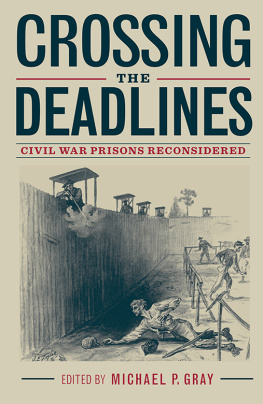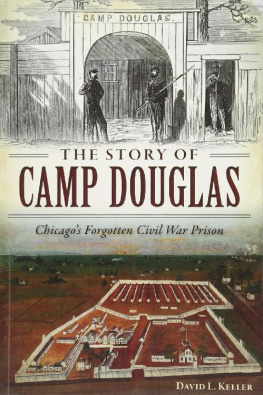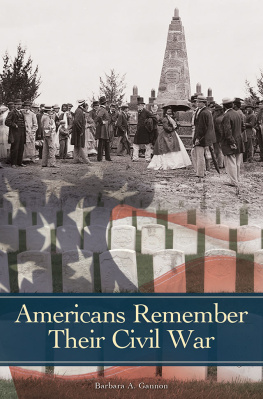2018 by The Kent State University Press, Kent, Ohio
All rights reserved
Library of Congress Catalog Number 2018008739
ISBN 978-1-60635-341-7
Manufactured in the United States of America
No part of this book may be used or reproduced, in any manner whatsoever, without written permission from the Publisher, except in the case of short quotations in critical reviews or articles.
Library of Congress Cataloging-in-Publication Data
Names: Gray, Michael P., 1968- editor.
Title: Crossing the deadlines : Civil War prisons reconsidered / edited by Michael P. Gray.
Description: Kent, Ohio : The Kent State University Press, [2018] | Includes bibliographical references and index.
Identifiers: LCCN 2018008739 | ISBN 9781606353417 (hardcover ; alk. paper)
Subjects: LCSH: United States--History--Civil War, 18611865--Prisoners and prisons. | Prisons--United States--History--19th century. | Excavations (Archaeology)--United States.
Classification: LCC E611 .C85 2018 | DDC 973.7/7--dc23
LC record available at https://lccn.loc.gov/2018008739
22 21 20 19 185 4 3 2 1
This distinguished collection has its antecedent in an earlier volume by the Kent State University Press. It began as a special issue of Civil War History (June 1962). The journal editor was James I. Robertson, known throughout the profession as Bud. William B. Hesseltine, legendary professor of history at the University of Wisconsin, wrote the introduction. He was the author of Civil War Prisons: A Study of War Psychology (1930; repr., Ohio State Univ. Press, 1998), which remains a classic. His assessment of prison camps on either side of the Cotton Curtain was a gloomy story of inept administration, short rations, inadequate shelter and medical care, and a stream of memoirs that reflected the lifelong resentment of the soldiers who managed to survive imprisonment. Ill treatment and neglect became a common theme in the collective memory of the war. Hesseltine concluded about the prisons, Perhaps, indeed, they also illustrate that the atrocities of the prison camps were only phases of the greater atrocity of war itself (3).
The special issue remains an oft-cited source; published in book form in 1972, as Civil War Prisons (Kent State Univ. Press), sales are now happily approaching 22,000. Among the authors, three are especially pertinent to the present volume and its editor. Bud Robertsons The Scourge of Elmira was a response to the notoriety of Andersonville and other Southern prisons. His essay was a powerful narrative, a long, accepted description of the wretched conditions that prevailed in Elmira. Ovid L. Futchs Prison Life at Andersonville was derived from his 1959 Emory University dissertation, later published as History of Andersonville Prison (Univ. Press of Florida, 1968). His book is a classic micro-monograph that remains a challenging touchstone for those who would understand Andersonville and its implications for the broader context of the Civil War. Frank L. Byrnes edited entry, A General Behind Bars: Neal Dow in Libby Prison, reflects his interest in Dow, as well as his many contributions to the study of Civil War prisons. Those of us who knew Frank well remain a bit amused that a prohibitionist was the subject of his dissertation and first book.
These articles and authors find an interesting and perhaps inevitable confluence in the career of Michael Gray. Frank Byrne, his doctoral advisor at Kent State, was one of William B. Hesseltines Ph.D. students at Wisconsin. Byrnes untimely and lamented passing in 2002 left his book on Civil War prisons unrealized, but Mikes dissertation became The Business of Captivity: Elmira and Its Civil War Prison (Kent State Univ. Press, 2001). It is a splendid monograph, rich in detail and especially informative, even pathbreaking, with reference to its community context.
In 2011, the University Press of Florida published a revised edition of Futchs History of Andersonville Prison, with a new introduction by Professor Gray. He presents Ovid Futch as prison micro-monograph pioneer and graces his subject with a masterful historiographical essay. His summary and analysis of reviews of Futchs book is a major contribution to the field. He aptly concludes with Frank Byrnes advice to students of Civil War prisons that they consult Futchs history.
Hesseltine and Futch and now Michael Gray quite properly call for an objective history, even of a subject as fraught as Civil War prisons. Professor Gray suggests that close reading and microstudies might lead to a better understanding of an era that still challenges historians. The chapters herein comprise an admirable beginning and continuing effort, but in a broader context for which the editor and authors deserve our thanks.
The cautionary notes of Hesseltine and Gray, and the pathbreaking articles herein, inspire questions and comments. It seems that prisons and prisoners have been almost incidental to the main currents of Civil War historiography, a part of the narrative yet somehow strangely apart from it. Just who was paying attention? Why the seeming indifference to the prisoners by individuals, North and South, who had the responsibility for and the means of easing conditions in the prisons? Who thought of intervention or acted in official or unofficial ways?
Consider the three men most often named when assessing Civil War generals. Grant and Lee might have effected a prison or prisoner exchange in 1864, but failed for reasons of principle. The Confederacy would not exchange black soldiers who may have been escaped slaves. Grant would not proceed if black soldiers were not included. Was there ever a more compelling time to rise above principle? Grant also understood that a policy of no exchanges would work to the advantage of the Union army. After all, Grants best subject at West Point (except for riding) was mathematics.
William T. Sherman had no particular sympathy for slaves or for enlisting blacks into the Union army, but after he captured Atlanta and set off on his march to the sea, did he consider liberating Andersonville? One presumes that most of the prisoners were white. His attitude is best summarized by his opinion that the problem was best left to William Hoffman, Union commissary general of prisoners.
And yet it is worth noting that Union officers in Charleston prison urged President Lincoln to agree to an exchange of prisoners, specifically those in Andersonville. Harry S. Stout, in Upon the Altar of the Nation (Viking Penguin, 2006), observes: While sympathetic, Lincoln remained unmoved, citing the moral obligation incurred by promises to black soldiers. By this point Lincoln was playing all sides of the moral card while bearing a large portion of the responsibility for unimaginable suffering and death (304). The subtitle of Professor Stouts sometimes unsettling book is A Moral History of the Civil War. This pervasive, if implied, theme invites (or demands) further reflection. In The Sense of the Past







